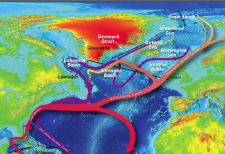|
Why Do We Study Salinity to Better Understand Ocean Circulation?
Salt ions have a greater mass than water molecules, so anything that increases the concentration of salt in water, such as evaporation,
increases the density of that water. As salinity increases, the density of that water increases, causing it to sink below less-dense
water. Therefore, deep ocean water mixing is driven by density differences.This process happens in the North Atlantic where cold, dense water sinks to deep ocean basins and is slowly carried to the tropics, where it is warmed and upwelled. The warmer, less-dense waters are carried back northwards to replace dense, sinking water at the surface. Through the transfer of heat into the atmosphere in the cold polar regions, the process restarts. A simplified version of this is often referred to as the Ocean Conveyor Belt. Featured Video: Ocean Memory and the Flywheel of Climate
An Oceanographer and the Water Cycle [NASA Earth Observatory] If one wants to find out what the water cycle is doing, one should be looking at the oceans
Density: Sea Water Mixing & Sinking [NASA Aquarius] Temperature and salinity help govern the density of seawater, which is a major factor controlling the ocean's vertical movements and layered circulation Liquid Rainbow [NASA Aquarius]
When solutions of two different densities meet, the lower density solution will move on top of the higher density solution, resulting in a layering or stratification of the solutions
Ocean Circulation [NASA Aquarius] A compilation of videos, activities, tools, and articles relating to ocean circulation Climate Change and the Global Ocean: Monitoring Climate Change Impacts By Satellite [NASA Aquarius]
Soon a new satellite will even help us see tiny particles on the ocean's surface - like salt, which drives huge conveyor belts of water through the world's oceans Salt of the Earth: Ocean Atmosphere Circulation Helps Moderate Climate [NASA Aquarius]
Things that happen now will still be manifest hundreds of years in the future Ocean Circulation [Center for Ocean Solutions]
The ocean is a major driver of global climate - it redistributes large amounts of heat around the planet via global ocean currents, through regional scale upwelling and downwelling, and via a process called thermohaline circulation How Understanding Salinity Helps Us Understand Climate Change [NASA Aquarius]
Part III of this COSEE-OS webinar focuses on the formation and melting of sea ice and how this affects ocean circulation How Does Salinity Drive Ocean Circulation? [CLIMB]
Concept map created by Dr. Tony Lee at the June 2011 Aquarius Pre-Launch Workshop in Pasadena, CA |






